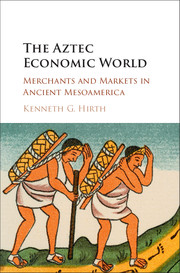Book contents
- Frontmatter
- Contents
- List of figures
- List of tables
- Preface
- Abbreviations
- 1 Introduction to the Aztec economic world
- 2 The structure of Mesoamerican economy
- 3 The Mesoamerican marketplace
- 4 Merchants, profit, and the precolumbian world
- 5 Often invisible: domestic entrepreneurs in Mesoamerican commerce
- 6 The professional retail merchants
- 7 Merchant communities and pochteca vanguard merchants
- 8 The tools of the trade and the mechanics of commerce
- 9 Conclusions
- Notes
- Glossary of Nahuatl and early colonial Spanish terms
- Bibliography
- Index
2 - The structure of Mesoamerican economy
Published online by Cambridge University Press: 05 May 2016
- Frontmatter
- Contents
- List of figures
- List of tables
- Preface
- Abbreviations
- 1 Introduction to the Aztec economic world
- 2 The structure of Mesoamerican economy
- 3 The Mesoamerican marketplace
- 4 Merchants, profit, and the precolumbian world
- 5 Often invisible: domestic entrepreneurs in Mesoamerican commerce
- 6 The professional retail merchants
- 7 Merchant communities and pochteca vanguard merchants
- 8 The tools of the trade and the mechanics of commerce
- 9 Conclusions
- Notes
- Glossary of Nahuatl and early colonial Spanish terms
- Bibliography
- Index
Summary
Any meaningful discussion of ancient commerce requires a comprehensive understanding of the prehispanic economy in which it occurred. The reason for this is simple: the economy is broader than the sum of the commercial transactions that it contains. Indeed, small-scale economies may lack commercial exchange relationships entirely, and may be organized primarily around gifting, mobilized transfers, and redistribution mechanisms. While commercial transactions were an important component of all Mesoamerican societies, many resources moved through non-commercial transfers at the household, community, and state levels. It is important, therefore, to situate commerce within the broader systems of production and distribution that define the economy.
Karl Polanyi (1957; Polanyi et al. 1957) emphasized the social dimension of premodern economies and how the production and movement of resources were embedded within larger social networks. From Polanyi's perspective, economic activities were not ends in themselves, but subordinate pursuits to achieve more important social, religious, and political goals. From a structural point of view Polanyi felt that simple forms of exchange could not take place apart from, and outside of, a variety of mediating social institutions that structured economic relationships. While he was correct in drawing attention to the diversity of ways that commercial exchange could be structured, he was incorrect in asserting that individual self-benefit and profit were not motives for trade and exchange. Individuals regularly engaged in exchange transactions across Mesoamerica to enhance their material well-being just as they did in other areas of the ancient world.
Mesoamerican economy is often described either in functional terms or from the perspective of its political economy. The functional perspective views economic behavior in terms of the production, distribution, and consumption of resources (Nash 1967). This approach sorts economic behavior into the key activities that individuals use to support themselves socially and to reproduce themselves biologically. Researchers following this approach in Mesoamerican studies have produced excellent economic studies on agriculture (Luna 2014; Rojas Rabiela 1983), craft production (Clark and Bryant 1997; Feinman and Nicholas 1993; Hirth 2008b; Muñera Bermudez 1985; Pastrana 1998; Sheets 1975), and trade (Dreiss and Brown 1989; Minc 2006; Stark and Garraty 2010). While a functional approach is useful for defining domains of economic behavior, it does not provide a synthetic understanding of the whole economy and how these economic sectors were integrated with one another.
- Type
- Chapter
- Information
- The Aztec Economic WorldMerchants and Markets in Ancient Mesoamerica, pp. 19 - 58Publisher: Cambridge University PressPrint publication year: 2016



